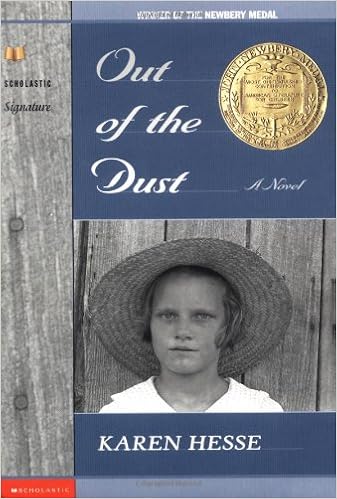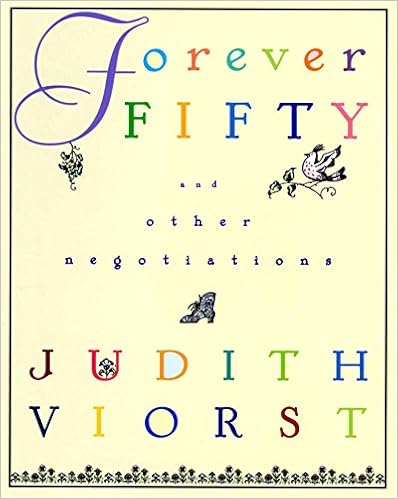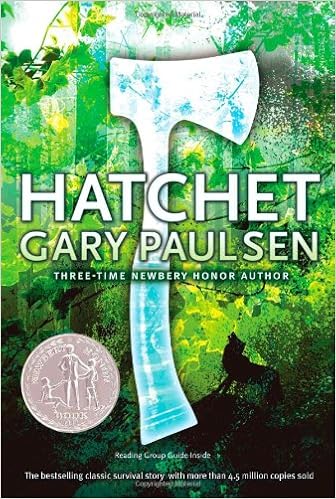It's National Poetry Month, so it's only fitting that the books I read this past week are written in verse!

I finished Karen Hesse's Out of the Dust, a Newbery winning fictional memoir of a young girl named Billie Jo living in the Dust Bowl of Oklahoma in 1934-35. Dust permeates every part of her life. She describes how the dirt clouds move and settle in her home and school, and even her body, as it covers her skin and works its way into her mouth, nose, and eyes--the grittiness of the dust is ever present. Hesse does not sugarcoat the difficulties of the farmers or the tragedies that occurred during this period, but because of Billie Jo's determination, we are pulled through the tough times with her family.
 My before-bed reading has been Judith Viorst's Forever Fifty and other negotiations, a collection of poems celebrating the ups and downs of turning fifty. I am a fan of Viorst's Alexander and the Terrible, Horrible, No Good, Very Bad Day, so I bought her poetry book as a gift to myself for my fiftieth. The poems are quirky and wise, with some lamenting over changes in body and relationships and some happiness with settling into your skin and knowing one's mind and purpose. I find myself reading and rereading each poem, just one or two at a time to think about before tucking in for the night.
My before-bed reading has been Judith Viorst's Forever Fifty and other negotiations, a collection of poems celebrating the ups and downs of turning fifty. I am a fan of Viorst's Alexander and the Terrible, Horrible, No Good, Very Bad Day, so I bought her poetry book as a gift to myself for my fiftieth. The poems are quirky and wise, with some lamenting over changes in body and relationships and some happiness with settling into your skin and knowing one's mind and purpose. I find myself reading and rereading each poem, just one or two at a time to think about before tucking in for the night.
It's Monday; what's on the nightstand next to your bed?
My fifth grade Book Lunch Bunch is responsible for most of the stretching I do as a reader during the school year. There seems to be a hole in my reading history of children's chapter books during the last two decades for various reasons, and reading with the Lunch Bunch is helping me fill in that hole book by book.
 A good example of this is Gary Paulsen's Hatchet, a Newbery Honor book originally published in 1987 and one of our current reads. It' not my usual genre, but I'm glad it was the students' choice this month. The main character, Brian Robeson, is thirteen and trying to sort out the life changes that come with the months-old divorce of his parents. His father has summer visitation rights, and Brian is flying out to Canada to see him when the single-engine plane crashes in the wilderness. With little more than a hatchet, gifted by his mother for the trip, Brian must survive on his own, waiting for an improbable rescue.
A good example of this is Gary Paulsen's Hatchet, a Newbery Honor book originally published in 1987 and one of our current reads. It' not my usual genre, but I'm glad it was the students' choice this month. The main character, Brian Robeson, is thirteen and trying to sort out the life changes that come with the months-old divorce of his parents. His father has summer visitation rights, and Brian is flying out to Canada to see him when the single-engine plane crashes in the wilderness. With little more than a hatchet, gifted by his mother for the trip, Brian must survive on his own, waiting for an improbable rescue.
 In The Book Nook, I've been reading The Most Magnificent Thing by Ashley Spires. The students are introduced to a "regular girl" and her best friend--her dog. The girl gets a "wonderful idea", and attempts to make it a reality. She keeps trying and trying...but the results don't quite align with the idea in her head. There are some great verbs to use as mentor text while she is working! The problem-solving process and portrayals of perseverance, frustration, and coping skills are great for open-ended questioning on the lessons we can learn from Spires' book.
In The Book Nook, I've been reading The Most Magnificent Thing by Ashley Spires. The students are introduced to a "regular girl" and her best friend--her dog. The girl gets a "wonderful idea", and attempts to make it a reality. She keeps trying and trying...but the results don't quite align with the idea in her head. There are some great verbs to use as mentor text while she is working! The problem-solving process and portrayals of perseverance, frustration, and coping skills are great for open-ended questioning on the lessons we can learn from Spires' book.
It's Monday; what are you reading with your students this week?
Reference: The Washington Post, "The surprisingly easy way to reduce your anxiety." Accessed 16 April 2016.
https://www.washingtonpost.com/news/to-your-health/wp/2016/04/07/the-surprisingly-easy-way-to-reduce-your-anxiety-thank-you-very-much/?tid=ss_fb-bottom
I am not a psychologist. I do not spend my time collecting data on the emotional/behavioral health of the 1000+ students on my campus. I do get to collaborate on a daily basis with great teachers, and observe students during lessons and check-out time in the library. While I would like to think of the library as an anxiety-free zone, I sometimes see it in our students. I definitely hear about it from the teachers (student anxiety, that is....teacher anxiety is a whole 'nother blog post!).
Reading the referenced article from The Washington Post, I began thinking about student anxiety in our pre-college population, and how it seems to be on the rise. I'm sure there are a multitude of reasons for this increase--crammed curriculum, overscheduling, a lack of time to play and develop social and coping skills come immediately to my mind. Some of those things we have control over as educators; some we don't.
What can we do in our classrooms and libraries to help ease this anxiety? According to the article, accomplishing acts of kindness may play a role in doing just that.
While some children are "givers" by nature, not every child is hard-wired to think up such acts, much less perform them. We can set up structured acts of kindness in our educational settings as opportunities for students to contribute to the well-being of our classroom, creating situations that make them positive contributors, putting others' well-being first, and opening up avenues for students to be on the receiving end of gratitude.
I know a lot of teachers do this already--by assigning classroom jobs to their students.
Yes, the mundane tasks of running a classroom, such as passing out paper, sharpening pencils, watering plants, straightening furniture and running notes to the office may be more efficiently done by an adult. Yes, I know that there is a lot of curriculum that needs to be covered, that students need to be engaged in academic work as much as possible.
But when did we decide that the academic work is more important than the communal aspect of our classroom? Brain-based research has shown us that students work best when they feel safe and accepted at school. Anxiety has the opposite effect; true learning doesn't occur when students feel constantly on edge. (To be clear, we are talking about generalized anxiety, not the "good kind" of stress that drives us to study harder and perform better in school.) Classroom jobs may be the ticket for decreasing stress and anxiety and increasing learning.
If you don't have a classroom job rotation, I propose that helpers, or even class-wide tasks that contribute to the running of the classroom such as daily trash pick-up, should be a regular part of your classroom. Yes, the plant may get over-watered, maybe the stacks of chairs might be a bit too high, maybe the pencils don't get passed out as quickly as you would have done. But the benefits may outweigh the hassles, especially for our anxious students.
Now that I've written this, I am inspired to do the same in my library! Let's see, they can straighten the furniture, pick up trash, look for wayward shelf markers, put the magazines back in order, turn books to face the right way, pass out lesson materials, help find display books.....
She came to the library to pick out her birthday book. The selections of new books weren't to her liking, so I showed her some I had pulled from our recent Scholastic Book Fair. Pax was on top of the pile. Her face lit up reading the dust jacket; she had found her birthday book.
I teased her by saying that I hadn't processed it so I could read it first, but since it was her birthday, I'd make an exception. My assistant entered it into our system, labeled and wrapped it that day, and I delivered it to the birthday girl.
She came back to the library, book in hand, in two days. "Here you go, Mrs. Margocs."
"You're done already?" I asked, worried that it hadn't been a good fit for her and that she was abandoning it.
"I couldn't stop reading it!" she replied, "I had to find out what happened next, every time I thought about putting it down. You have to read this, it's really good! Kinda sad, kinda happy....but really good!"
I promised I would move it to the top of my to-read pile. She promised to check in with me after the weekend, to hold me accountable.
*********
Yes, birthday girl, I read Pax by Sara Pennypacker, illustrated by Jon Klassen. Klassen is a favorite of mine, and his dark colors (the inner pictures are done in blacks and grays) suit this story about a boy and his fox, caught in the turmoil of grief, anger, and the approaching battlelines of war.
Peter is forced to abandon his pet fox, Pax, when his father enters the military during wartime. At his grandfather's home hundreds of miles away, Peter soon realizes that leaving Pax was a mistake that he must rectify.
Peter sets off on his own to rescue his pet. As he stumbles through unfamiliar territory, we learn of the loss of his mother, the anger of his father, and the love he has for the fox that helped tame his grief. In alternating chapters, we are privy to Pax's experience and thoughts as he navigates the wild for the first time.
Peter and Pax both meet benefactors when help is needed most--and both realize they have something to give in return. There are parallels in their stories as they overcome major obstacles to survival and reunion.
The birthday girl was right--the ending is kinda happy, but sad, as well. War is the background story, and Pennypacker does not soften the effects of combat on families, communities, and nature. The relationship between humans and wild animals is not simplified. We are left to ponder the complexities of both in the end.

 My before-bed reading has been Judith Viorst's Forever Fifty and other negotiations, a collection of poems celebrating the ups and downs of turning fifty. I am a fan of Viorst's Alexander and the Terrible, Horrible, No Good, Very Bad Day, so I bought her poetry book as a gift to myself for my fiftieth. The poems are quirky and wise, with some lamenting over changes in body and relationships and some happiness with settling into your skin and knowing one's mind and purpose. I find myself reading and rereading each poem, just one or two at a time to think about before tucking in for the night.
My before-bed reading has been Judith Viorst's Forever Fifty and other negotiations, a collection of poems celebrating the ups and downs of turning fifty. I am a fan of Viorst's Alexander and the Terrible, Horrible, No Good, Very Bad Day, so I bought her poetry book as a gift to myself for my fiftieth. The poems are quirky and wise, with some lamenting over changes in body and relationships and some happiness with settling into your skin and knowing one's mind and purpose. I find myself reading and rereading each poem, just one or two at a time to think about before tucking in for the night.


